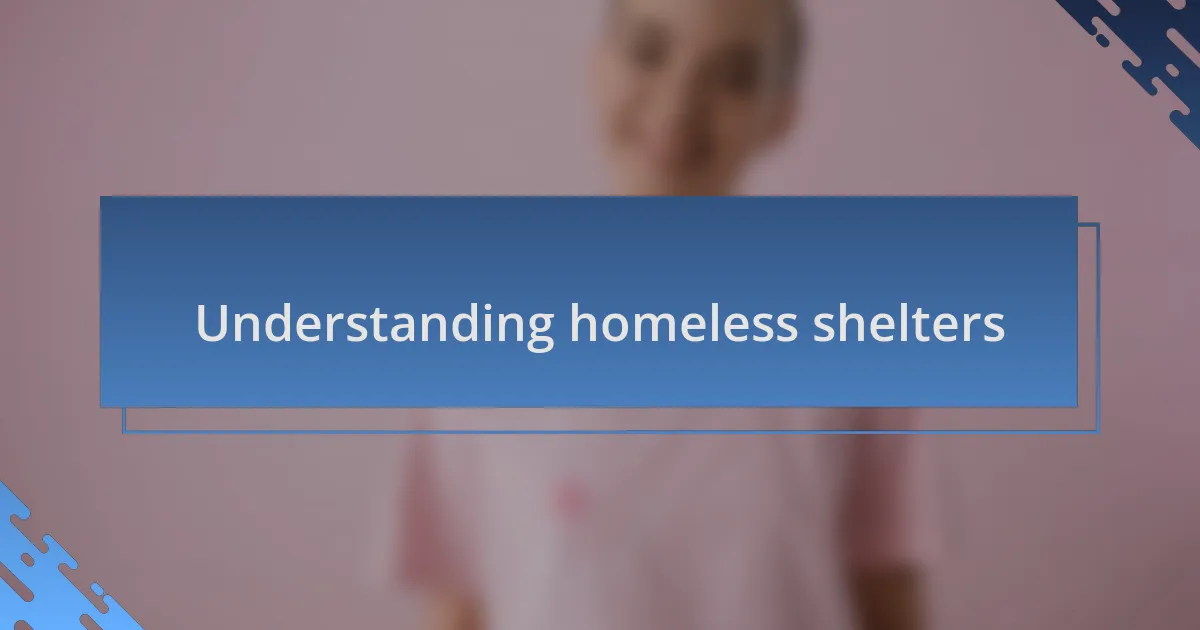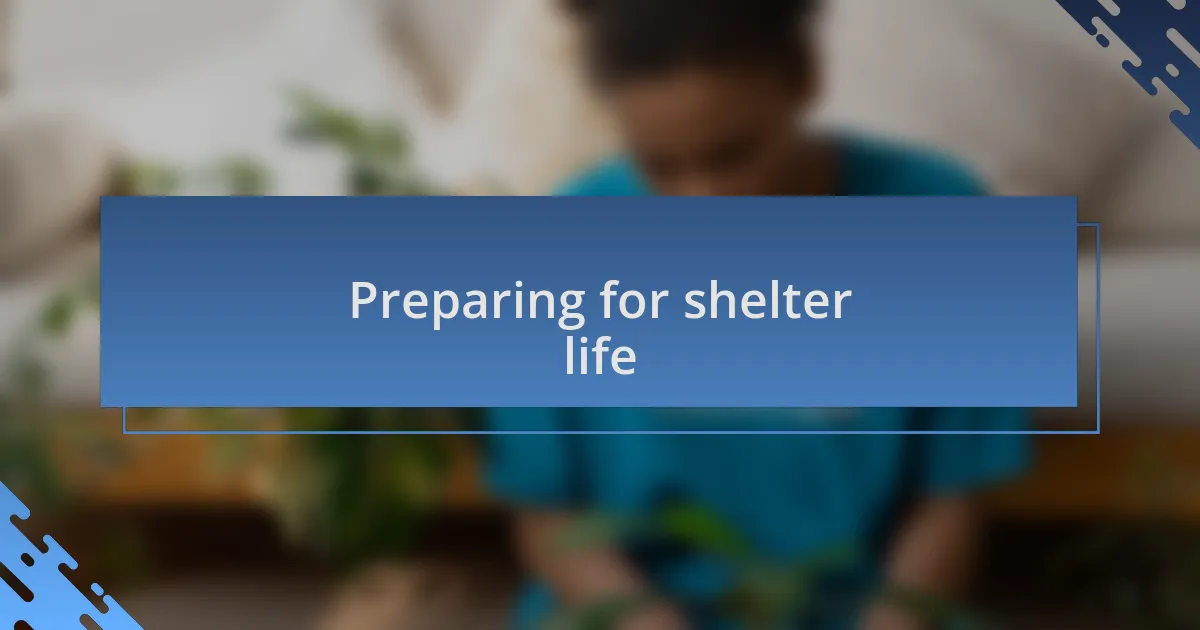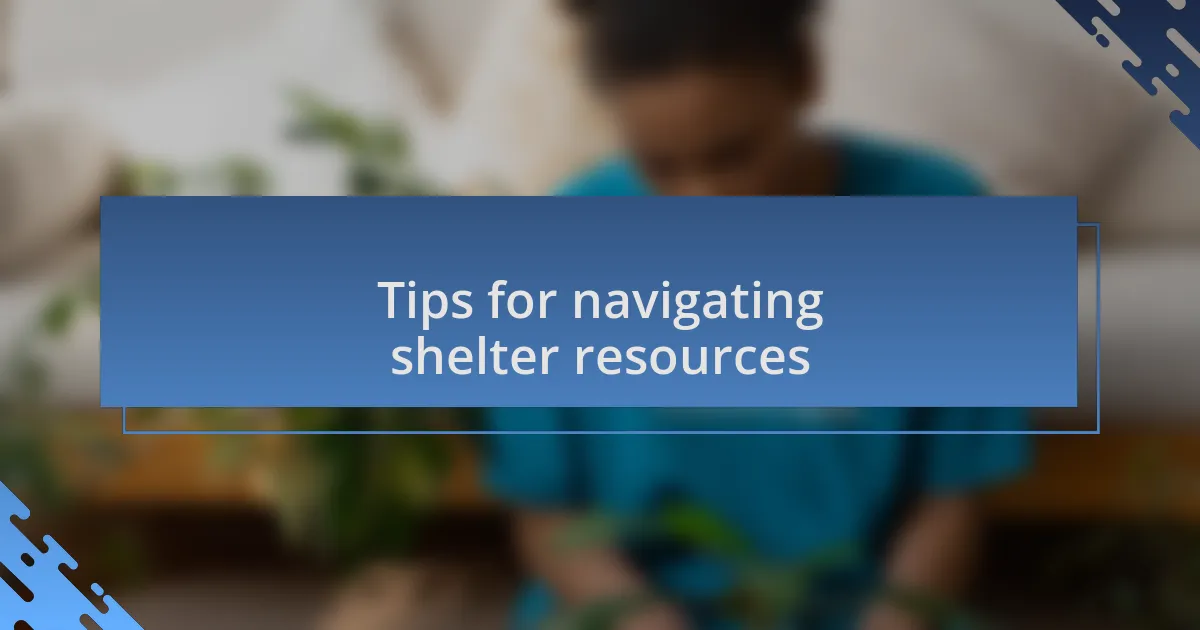Key takeaways:
- Homeless shelters provide essential support beyond just shelter, including counseling, job training, and medical assistance, which can help individuals regain stability.
- Homeless charities play a vital role in advocating for systemic change and fostering community, helping to empower vulnerable members of society.
- Common misconceptions about shelters include the beliefs that they lack support services and are unsafe; in reality, they often offer comprehensive resources in a secure environment.
- Preparing for shelter life involves gathering information, packing essential items, and adopting a positive mental attitude to ease the transition.

Understanding homeless shelters
When I first walked into a homeless shelter, I was unexpectedly overwhelmed by the mix of emotions—hope intertwined with vulnerability. Homeless shelters are often more than just a place to sleep; they serve as vital support systems, offering not only a roof but also resources like counseling, job training, and medical assistance. Can you imagine facing the uncertainties of life on the streets, knowing that a shelter could provide not just basic needs but also a stepping stone toward stability?
I remember speaking with one resident who expressed how the shelter became her sanctuary during a turbulent time. She shared that, despite the stigma often associated with homelessness, she found a community of individuals who understood her struggles. These places are often the unsung heroes, quietly working to empower people to regain their independence and self-worth. Isn’t it fascinating how we can find strength in shared experiences?
It’s important for newcomers to know that every shelter operates differently, shaped by its mission and resources. Some may focus on immediate relief and safety, while others might prioritize long-term recovery and rehabilitation. Understanding these nuances can be crucial; when I learned about various programs offered, it transformed my view of shelters from transient stops to invaluable lifelines. How can we support these crucial programs and ensure they reach those who need them most?

Importance of homeless charities
When I reflect on my journey with homeless charities, I realize how crucial they are in bridging the gap between despair and hope. They don’t just provide basic necessities—they cultivate dignity and self-empowerment. I once volunteered at a charity event where I saw firsthand how life skills workshops helped individuals transform their lives. It made me wonder: wouldn’t it be incredible if every community recognized the potential of its most vulnerable members?
Additionally, these charities often serve as a voice for the homeless, advocating for much-needed systemic change. I remember listening to a poignant speech from a former resident who emphasized that their stories need to be heard. It struck me that homeless charities channel these narratives into action, influencing policies and dispelling myths that perpetuate stigma. Isn’t it fascinating how the act of sharing experiences can lead to a ripple effect of compassion and understanding?
Moreover, the sense of community fostered by these organizations can’t be overstated. After attending a community meal organized by a charity, I felt an overwhelming sense of belonging among people from all walks of life. I realized that, beyond providing essentials, these charities are instrumental in building social connections. How powerful is it that something as simple as sharing a meal can humanize the challenges of homelessness?

Common misconceptions about shelters
One common misconception about shelters is that they are merely places where people go to sleep, devoid of any support services. I remember when I first thought this way; I assumed shelters were just warehouses for the homeless. However, many shelters offer comprehensive programs, including counseling, job training, and health services, all tailored to help individuals regain stability. Isn’t it empowering to think that shelters can be stepping stones towards a better future?
Another myth is the idea that shelters are unsafe or chaotic environments. My early impressions were shaped by sensationalized media portrayals, which often focused on the negatives rather than the transformative stories. In reality, many shelters prioritize safety and cultivate a sense of community among residents. After speaking with individuals who found support and friendships within those walls, I realized how important a secure environment is for healing and growth. Don’t we all deserve a safe space to rebuild our lives?
Many people also believe that staying in a shelter is a long-term solution for homelessness. This perspective can be misleading. My conversations with former residents opened my eyes to the fact that most people view shelters as temporary havens. They use the resources available to develop skills and find permanent housing. Isn’t it remarkable how a place designed for short-term refuge can become a launchpad for achieving independence?

Preparing for shelter life
Preparing for shelter life requires a shift in mindset. When I first considered entering a shelter, I was anxious about the unknown. I found it helpful to gather as much information as possible about the shelter’s rules and services. Understanding what to expect made me feel more in control and less apprehensive. Have you thought about how knowledge can ease your fears?
Packing for shelter life is another essential step. I remember deliberating over what to bring and eventually realized that practicality was key. Comfortable clothing, hygiene products, and essential paperwork became my priorities. I also added a few personal items, like a book or a small photo, which helped me maintain a sense of self during a challenging time. What little comforts do you think you would want to hold onto in a new environment?
Finally, I learned the importance of preparing mentally for the transition. Moving into a shelter wasn’t just a change of location; it was a shift in my lifestyle. I began to practice mindfulness to help ground myself. Simple techniques, like focusing on my breath or jotting down my thoughts, helped me navigate this new chapter. How do you typically cope with life changes?

Tips for navigating shelter resources
Navigating shelter resources can feel overwhelming at first, but I learned that asking for help is key. When I arrived at my shelter, I was hesitant to approach the staff, fearing judgment. However, once I did, I found them to be incredibly supportive. They guided me through available services, like healthcare and job training programs. Have you ever hesitated to seek assistance only to find it was readily offered?
Another tip is to connect with fellow residents. Building relationships with others in the shelter turned out to be one of my greatest resources. Sharing experiences not only provided emotional support but also valuable insights into navigating the system. I remember one resident who introduced me to a local food bank, which eased the financial burden. How amazing is it when someone understands your situation and lends a helping hand?
Lastly, keep a journal to track your progress and feelings throughout your stay. I found that writing helped me process my experiences, and it often revealed patterns I wasn’t aware of. Documenting my feelings gave me clarity and motivated me to pursue goals, such as finding stable housing. Have you ever noticed how writing can help you understand your journey better?

Personal experiences and lessons learned
The first time I walked into the shelter, I felt a wave of emotions—fear, uncertainty, and a flicker of hope. I had no idea what to expect, but I quickly learned the importance of staying open-minded and adaptable. I remember one night when a group of us sat together sharing our stories; those conversations grounded me and reminded me that I wasn’t alone. Have you ever found comfort in the shared experiences of others?
One lesson I treasure is the significance of boundaries. Initially, I felt overwhelmed by the sheer number of people around me. It took me some time to realize that setting personal boundaries was crucial for my mental health. There was a moment when I needed to step back and take a breather instead of pushing myself to engage constantly. It was okay to take time for me, and honoring that space made a world of difference.
I also discovered that every little victory counts. The day I managed to secure my first job interview was a turning point. I remember bouncing back to the shelter, heart racing with excitement. It reinforced the idea that progress isn’t always about grand achievements; sometimes, it’s those small steps that lead to significant changes. Have you experienced a moment where a small win felt monumental?